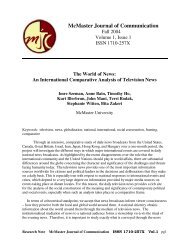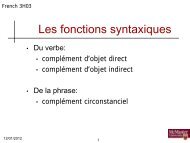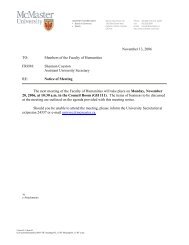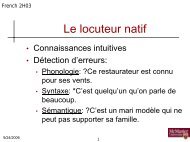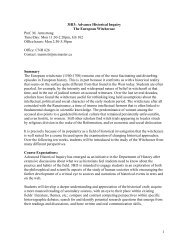The Syntax of Givenness Ivona Kucerová
The Syntax of Givenness Ivona Kucerová
The Syntax of Givenness Ivona Kucerová
You also want an ePaper? Increase the reach of your titles
YUMPU automatically turns print PDFs into web optimized ePapers that Google loves.
will thus modify the definition <strong>of</strong> G-movement from (11) in order to capture the distinction<br />
between lexically given and lexically ambiguous items. <strong>The</strong> new definition <strong>of</strong> G-movement<br />
is given in (59). A definition <strong>of</strong> what it means to be lexically given is in (60).<br />
(59) G-Movement [version 2]<br />
G-movement is required iff α G is asymmetrically c-commanded by a non-G element;<br />
unless<br />
a. the movement is independently blocked, or<br />
b. α G is lexically given.<br />
(60) Lexically given<br />
α G is lexically given if its semantic lexical entry requires α G to have a salient<br />
antecedent A such that α and A corefer.<br />
Let’s first have a look at what happens if α G is required to move but it is in a position<br />
from which it cannot move at all. 23 In Czech, G-movement is impossible out <strong>of</strong> a specifier<br />
or out <strong>of</strong> a syntactic island. 24 Consider the context in (61). As we can see in (62)–(64), if<br />
a given element is within a specifier, it cannot be realized as a bare NP/DP, as can be seen<br />
in (a)–(b). 25 To make such a sentence felicitous, the given element must be realized either<br />
as a possessive pronoun, as in the (c) examples, or the relevant DP must be modified by a<br />
demonstrative pronoun, as in the (d) examples.<br />
(61) Na programu byla diskuse o nové učitelce. ←− context I<br />
on program was discussion about new teacher<br />
‘<strong>The</strong> topic <strong>of</strong> the program was a discussion about a new teacher.’<br />
(62) a. #Důvodem bylo podezření, že dcera (nové) učitelky bere drogy.<br />
reason was suspicion that daughter <strong>of</strong>-new teacher takes drugs<br />
‘<strong>The</strong> reason was a suspicion that a daughter <strong>of</strong> a new teacher is a drug-addict.’<br />
b. #Důvodem bylo podezření, že učitelčina dcera bere drogy.<br />
reason was suspicion that teacher’s daughter takes drugs<br />
‘<strong>The</strong> reason was a suspicion that a daughter <strong>of</strong> a new teacher is a drug-addict.’<br />
c. Důvodem bylo podezření, že její dcera bere drogy.<br />
reason was suspicion that her daughter takes drugs<br />
‘<strong>The</strong> reason was a suspicion that her daughter is a drug-addict.’<br />
d. Důvodem bylo podezření, že dcera té (nové) učitelky bere drogy.<br />
reason was suspicion that daughter <strong>of</strong>-that new teacher takes drugs<br />
‘<strong>The</strong> reason was a suspicion that a daughter <strong>of</strong> that new teacher is a drugaddict.’<br />
23 I thank to Danny Fox for suggesting this test to me and helping me to figure out its consequences.<br />
24 It has been argued that Slavic languages, including Czech, allow Left-branch extraction, thus, movement<br />
out <strong>of</strong> the specifier might be possible, see for example, Bošković 2005; Citko 2006. Putting aside whether or<br />
not there is Left-branch extraction in Czech, the restriction on moving from specifiers does not need to follow<br />
from this constraint. Since no head movement can take place out <strong>of</strong> a specifier, G-movement is expected to<br />
be blocked independently <strong>of</strong> the Left-branch extraction properties <strong>of</strong> Czech.<br />
25 In the (a) examples, the DP is realized post-nominally, while in the (b) examples it is realized prenominally.<br />
Both options are possible in Czech. <strong>The</strong> difference is that a DP in a pre-nominal position cannot<br />
be further modified.<br />
36







